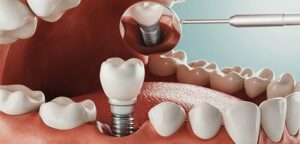What are the risks of dental implants?
The problem of losing teeth is one of the serious problems facing patients, as losing them leads to a deficiency in the function of the mouth and its inability to perform its tasks of cutting food. Therefore, dental implants came as a solution to all dental problems and instead of what was lost. In this article, we will learn about the dangers of dental implants and way to avoid it.
What are the possible risks after dental implants?
When the patient performs dental implants, he must be aware of the risks of this process, which are:
- Infection, as it is considered one of the dangers of dental implants and appears in the form of symptoms of abscess or pus in the place of dental implants.
- Bleeding.
- An allergic reaction to titanium implants in some patients.
- The occurrence of a fracture in the abutment of the tooth or in the implanted tooth itself.
- Sinus infection and health problems.
- Injury to the surrounding nerves and presents with a feeling of numbness and tingling in the lips, gums or tongue.
- Tissue necrosis around the implanted tooth.
- Failure of the surgical wound to heal.

The most important side effects after dental implants
In most cases, there are no side effects, but symptoms may occur, which are:
- Pain in the place of cultivation
- Bleeding at the site of cultivation.
- Swelling of the gums and face.
- Bruising of the skin and gums.
The most important tips after dental implants
After 48 hours, the patient should:
- Refrain from eating or drinking anything for 24 hours after the operation.
- Do not exercise during this period.
- Do not touch the planting area with your tongue or finger.
- Do not use a toothbrush for eight hours after the procedure.
- Not rinsing the mouth for 24 hours after the operation.
The first week after planting
Dentures or dental guards should not be used for at least 10 days after the procedure, in order for the dental implants to be successful.
The most important instructions up to a month and a half of the procedure
- Not eating directly on dental implants, especially in the first 3 months of implantation.
- Brushing and toothpaste for dental implants just like natural teeth.
- Maintain excellent hygiene of the mouth and teeth, whether they are natural or implanted, by cleaning them from the nooks and crannies around the teeth, gums and metal.
- Avoid habits that are harmful to the teeth and do not chew hard ones such as ice and hard candy that can break the crown of the implanted tooth or the natural teeth.
- Avoid chewing tobacco and caffeine products, and get appropriate treatment if needed.
The importance of the type of transplant to reduce side effects
The implants are made of titanium, which is a solid metal capable of withstanding pressure and grinding functions resulting from the placement process. It is also biocompatible with the body in most patients and does not cause allergies. Other materials such as zirconium may be added to it to improve it functionally and aesthetically. The outer part of the implant, which is the crown, consists of Of different materials, the crown may consist of a metal core surrounded by porcelain, or it may be made entirely of porcelain, and in the best types of dental implants, a crown made of zirconium, famous for its hardness and similarity to the teeth in shape and color, may be used. Each type has its advantages, characteristics and price, and the doctor’s experience plays an important role in avoiding potential problems that occur after dental implants.
What should I do if complications occur after dental implants?
The patient should see his doctor immediately if the following symptoms appear:
- Bleeding continues or increases in quantity.
- Sensation of numbness in the jaw and face.
- The patient’s temperature rises.
- The appearance of symptoms of inflammation.

Zein Clinic experience in dental implants
Zein Clinic is characterized by the latest dental implant technologies, as it has doctors with extensive experience in the field of dental implants, which guarantees the patient a higher success rate for the dental implant process, which takes place under strict sterilization conditions, which ensures that no infection occurs during the surgical work, in addition to keeping the doctor in contact with the patient after the operation, which Ensures that implants do not fall out in the long run.
This content has been approved by Zein Clinic doctors
To contact the doctor and provide a free consultation, click here:
Did you like our theme? You can share it with your friends now!
Read More:
The most important tips before and after dental Implants
Maxillary sinus lift for dental implants
Sources: Emedicine


 واتساب
واتساب